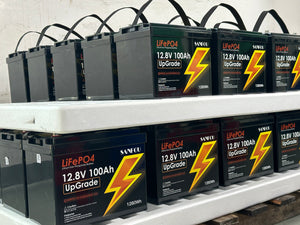Maintenance of Lithium Iron Phosphate Battery
Jul 20, 2024
| As lithium iron phosphate batteries are more and more used in life, people usually ask how to maintain it in daily life. Perhaps there are still many people who don't understand lithium iron phosphate batteries, so let's explore the characteristics and maintenance methods of lithium iron phosphate in this article. What is a lithium iron phosphate battery? Lithium iron phosphate battery, is a lithium ion battery that uses lithium iron phosphate (LiFePO4) as the positive material and carbon as the negative material. Lithium iron phosphate is characterized by high energy density, safety performance and long cycle life, and it is green and pollution-free in the process of use, so it is an environmentally friendly battery. It is widely used in the fields of electric cars, renewable energy storage systems and various portable electronic devices. Due to its high thermal and chemical stability, it is chemically more stable compared to other types of lithium-ion batteries. The safety this brings is mainly due to the strong chemical bonds within the lithium iron phosphate structure, which makes them less prone to thermal runaway and overheating. They are safer in use (they will not burn or explode due to improper operation such as overcharging, over-discharging and short-circuiting). Smaller size and lighter weight. Compared with lead-acid batteries, LiFePO4 batteries are 1/3 smaller and 2/3 lighter than lead-acid batteries with the same capacity, making them more portable, convenient and affordable. Although from the point of view of a purchase, LiFePO4 battery is more expensive, but its life expectancy can reach up to 10 years, the number of cycles 4000 +, while lead-acid batteries need to be replaced once every 2-3 years, long-term use, LiFePO4 battery is more affordable, but also reduces the need for replacement. Safety Features Stable electrochemical properties: The stable electrochemical properties of Li-FePO4 batteries reduce the generation of gas during charging and discharging because of its stability. Resistance to thermal runaway: The chemical structure of Li-FePO4 battery can effectively resist thermal runaway and reduce the situation of uncontrolled temperature rise during use. Maintenance Precautions: 1. Although it reduces the generation of gases in the electrochemical reaction, it still needs to pay attention to ventilation in some application scenarios. Especially in large-scale energy storage systems and electric vehicles, where battery packs are tightly packed and charge/discharge rates are high, the need to pay attention to ventilation is an additional safety measure in order to avoid accidents. 2. Phosphoric acid batteries can be placed in sealed boxes, but attention should be paid to the ambient temperature, ventilation, to prevent physical damage, and to pay attention to the situation during charging. Avoid extreme temperatures, extreme temperatures will affect the battery life and performance, so even when placed in a sealed box, attention should be paid to the temperature. 3. Although LFP batteries produce less gas, in order to prevent gas from being generated due to physical damage, etc., it is important to ensure that the environment is ventilated when the batteries are stored and used. 4. If the battery is to be stored for a long period of time, it is recommended that it be stored in a partially charged state (approximately 30-50%) to prevent self-discharge and degradation. 5. Frequently check whether the poles of the battery are loose, damaged, deformed or corroded; whether the battery case is damaged, leaking and deformed. Test whether the voltage meets the requirements, if you do not often use lithium batteries, you need to complete a charging cycle for lithium batteries every month to do a power calibration, i.e., deep discharge and deep charge once. Do not mix the lithium iron phosphate battery with metal objects, so as to avoid metal objects touching the positive and negative poles of the battery, resulting in a short circuit, damage to the battery or even cause danger. 6. Lithium iron phosphate battery should be in a clean, dry, ventilated environment, should avoid contact with corrosive substances, away from fire and heat sources. Conclusion LiFePO4 has excellent performance and can be used for camping, home energy storage, off-grid systems, and is widely used in more and more areas of life.SANFOU has also launched a series of different models of LiFePO4 batteries to meet your energy needs! |


